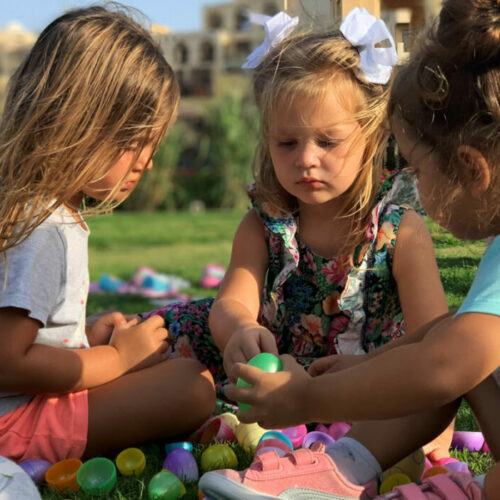The power of saying ‘How about we…’

Here’s why the simple phrase ‘How about we…’ can be a game-changer during challenging parenting moments!
Knowing exactly what to say in tricky situations as a parent isn’t always easy. With so much advice and information out there, it can sometimes feel overwhelming. When your little one’s behaviour becomes stressful or challenging, having the right words to guide the moment is essential. While there’s no one-size-fits-all approach to parenting, a versatile phrase that can work wonders is “How about we…?” This phrase not only helps you navigate difficult moments, but also creates opportunities for your child to feel included and empowered, while encouraging them to choose positive behaviour.
Focus on solutions
Discipline isn’t just about correcting bad behaviour – it’s about teaching kids how to make better choices. This is where the power of “How about we…” comes in. When a child makes a mistake or behaves inappropriately, rather than focusing on what went wrong, this phrase shifts the conversation towards solutions.
It’s all too easy to fall into a cycle of using harsh words or the knee-jerk response of “Don’t do that!” Instead of this, try saying, “How about we take turns with the toy next time?” or “How about we use our words instead of getting upset?” This gentle redirection focuses on what to do differently, reinforcing positive behaviour in a way that feels constructive rather than punitive.
Using “How about we…” helps children feel like they’re part of the process and gives them the sense that they have the power to make better choices. It transforms mistakes into learning opportunities, encouraging your child’s growth without the negativity that comes from punishment.
Building connection
One of the reasons this phrase works so well is that it creates a sense of togetherness. Saying “How about we…” implies that you and your child are on the same team, working together to figure out the best course of action. This approach reduces the feelings of isolation and defensiveness that can arise from being told off, and instead promotes connection and cooperation.
When kids feel included in the decision-making process, they’re more likely to engage with you positively. For example, if your little one is refusing to tidy up, instead of demanding, “Clean up your toys!” try asking, “How about we clean up together, so we can have more space to play?” This phrasing not only sounds less confrontational, but it also encourages teamwork and makes the task feel less daunting.
By making the experience more collaborative, you’re nurturing your child’s sense of responsibility while reinforcing the message that they’re not facing challenges alone.
The benefit of ‘so that’
Another great trick is to pair “How about we…” with the phrase “so that” to explain why the action matters. This shows your little one the reasoning behind the behaviour you’re encouraging, reinforcing the value of good choices.
For instance, you could say, “How about we put the crayons away, so that we don’t lose them?” or “How about we share the last cookie, so that everyone gets a piece?” This simple explanation helps your child understand the impact of their actions and the positive outcome that follows. It teaches them that good behaviour isn’t just expected for its own sake – it has real benefits for everyone.
Older kids
“How about we…” isn’t just for young children – it can be adapted for older kids too. As children grow, they need to feel more in control and independent. To encourage this, you can use “How about we…” as a jumping-off point to give kids a greater sense that you’re asking and not telling, which creates the feeling that you see them as more responsible and mature.
With older children, try framing it as a suggestion rather than a directive. For example, “How about we talk about what happened earlier?” or “How about we figure out a way to solve this together?” This keeps the dialogue open, showing your child that their input matters while still guiding them towards better decisions.
It can also be a great way to navigate delicate conversations. If your pre-teen is feeling overwhelmed with schoolwork or social pressures, asking “How about we look at your schedule together, so you don’t feel so stressed?” opens the door to problem-solving, without sounding like a lecture.
A positive mindset
Ultimately, using “How about we…” shifts the focus from what went wrong to what can be done right. It sends a clear message to your child that mistakes aren’t the end of the world – they’re opportunities to learn and improve. This positive framing not only helps kids feel better about themselves in the moment, but it also teaches resilience and problem-solving skills they’ll carry with them into adulthood.
In tricky parenting moments, the words you choose can make all the difference. “How about we…” is a simple, yet powerful phrase that helps you turn everyday challenges with your little one into chances to grow, helping your child become more confident, capable and ready to face whatever comes next.
Image Credit: ShutterStock











Comments